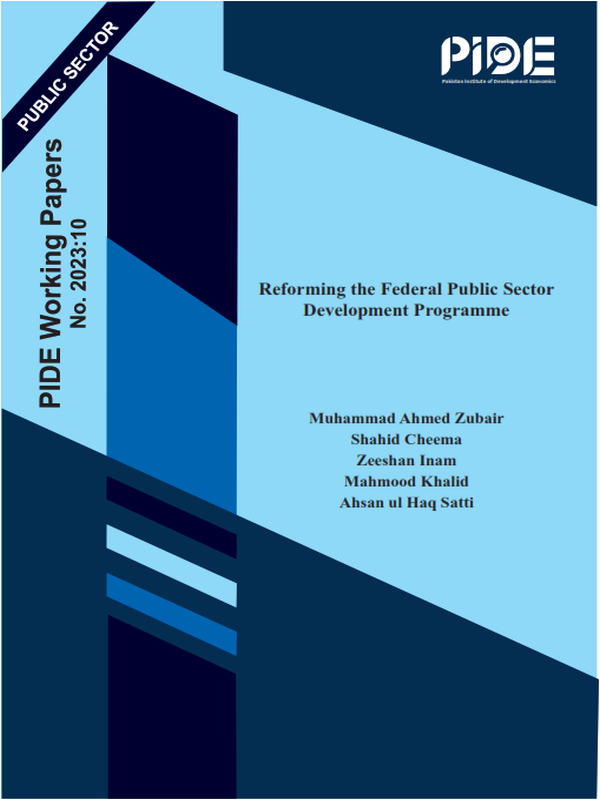
Pakistan Institute of Development Economics
- Home
Our Portals
MenuMenuMenuMenuMenuMenuMenu - ResearchMenuMenuMenuMenuMenuMenuMenu
- Discourse
- The PDR
- Our Researchers
- Academics
- Degree Verification
- Thesis Portal
- Our Portals
Reforming the Federal Public Sector Development Programme
PREFACE
Public Sector Development Programme (PSDP) is an instrument to implement the Govt’s development priorities. Federal PSDP is aligned towards objectives / Targets of Annual/Five-year plans/ Vision. The Government provides infrastructure, builds up national capital, develops human capital, initiates various sectoral programme. Public investment has a multiplier effect on economic growth. It impacts the private sector investment, leverages potential of the economy for creation of much needed social goods and acts as enablers of private investment. The economically and financially viable projects are prioritised and financed under PSDP. Efforts are made to utilise scarce public resources optimally and efficiently to attain long run sustainable development goals.
However, evidence suggests that public investment could not succeed to act as a driver of economic growth. One of the key reasons for insignificant impact of PSDP on economic growth is drastic decline of development expenditure. The development expenditure was 7.5 percent of GDP in 1992, it shrunk to 2.5 percent of GDP in 2000 and further declined to 1.7 percent of GDP in 2020 and currently, it is around 1 percent of GDP. The inclusion of new projects in PSDP each year increases throw-forward effect. Thin allocation to large number of projects, resulted in cost-overrun and time overrun of the projects. Resultantly, the economically and financially viable projects become unviable due to delay in their implementation. The data indicated that among Nos. 931 on-going development projects, 16 percent (Nos. 148) development projects are subject to cost overrun. Whereas 59 percent (Nos. 551) projects are facing time overrun. Financing the PSDP through Foreign assistance, on account of resource scarcity, needs a counterpart allocation. The commitments of foreign funding for these projects, often, are not fully realised which jeopardise the overall project portfolio and increases pressure on domestic resources.
In order to support this infrastructure led development, the institutions have repeatedly been weakened and their role in policy planning reduced. There is immediate need of portfolio cleaning and other measures to make the existing portfolio smart. This study furnished its recommendations including Portfolio Cleaning, Project Completion/ Closure Facility, Creating Additional Resources for Rapid Completion of Projects etc.



